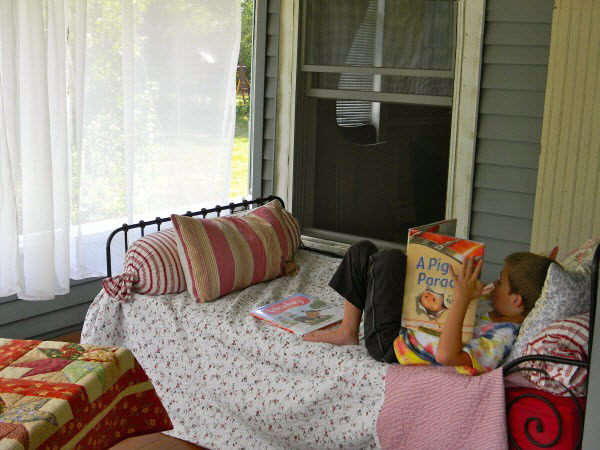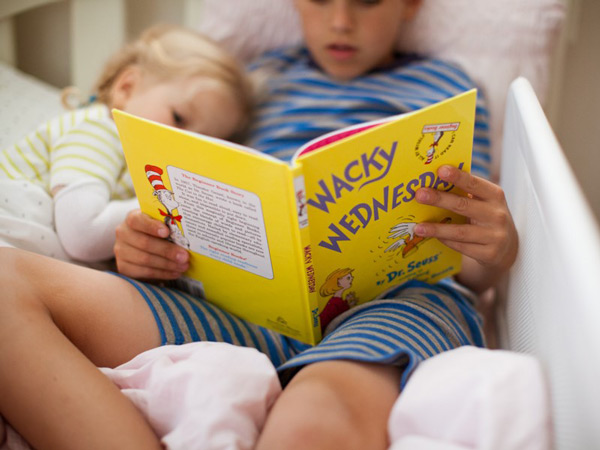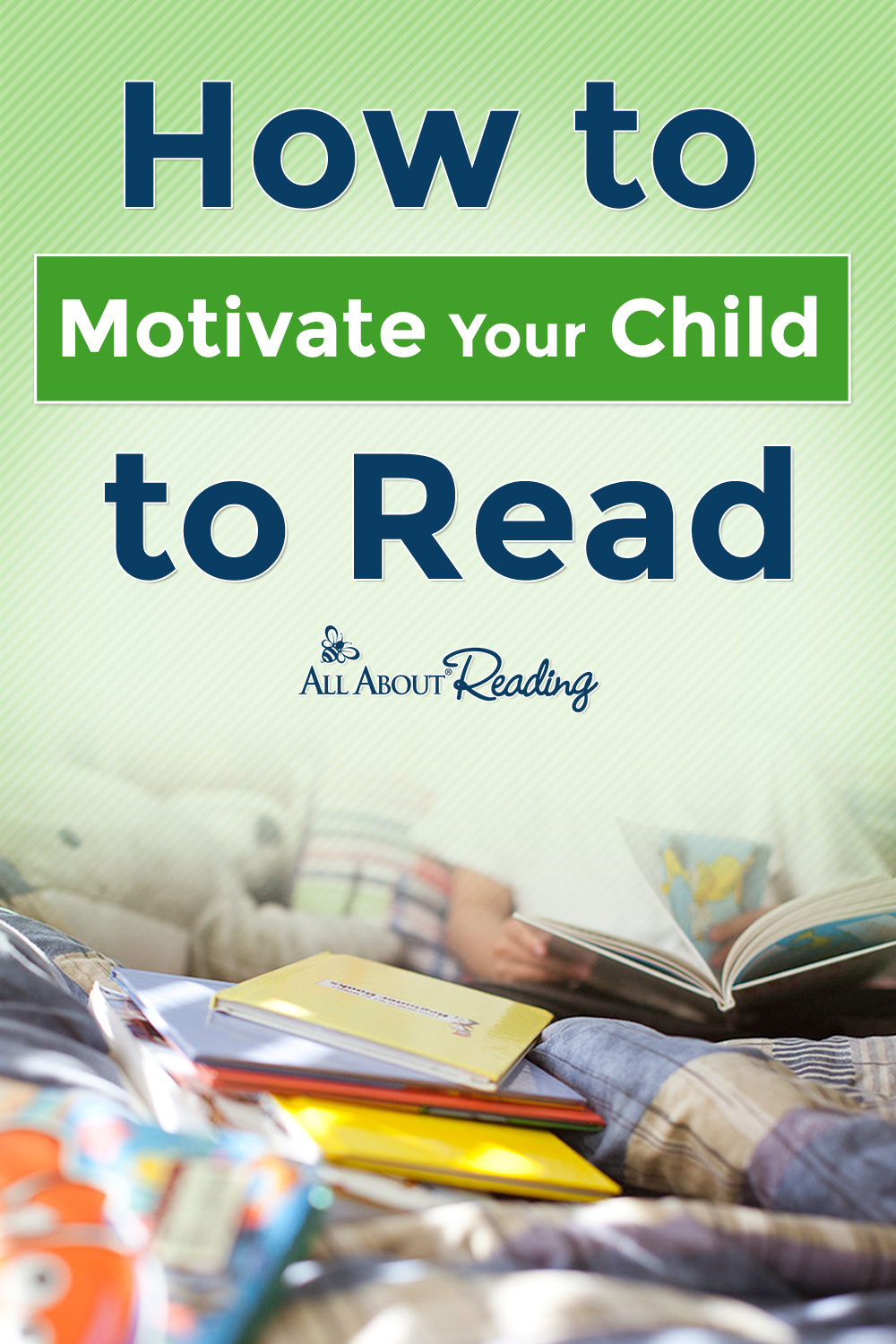How to Motivate Your Child to Read

Quick poll: Which category is your child in?
- LOVES to read!
- Could take it or leave it.
- Really dislikes reading.
Our goal—and I’m guessing it’s your goal too—is to get your child into the first category.
But what can you do if your child just isn’t motivated to read?
There is actually quite a bit you can do to encourage a love of reading, but first, let’s do some detective work.
Why Doesn’t Your Child Like to Read?
Before you work on motivating your child, it helps if you understand why he resists reading in the first place. Which scenario depicts your resistant reader?

“Reading is hard!”
You probably wouldn’t choose hard work as a leisure activity, and that’s true for your child, too. If reading is a struggle, he probably won’t find reading interesting or enjoyable.
If your child is a struggling reader, take a look at why this might be. Does he have issues with fluency, or have gaps in his phonogram knowledge? Maybe he’s struggling because he’s guessing at words or hasn’t developed strong vocabulary skills. It’s even possible he has dyslexia or another learning challenge. But whatever the cause, if your child feels that reading is too much work, begin by identifying and addressing his areas of weakness. As he becomes a better reader, he will enjoy reading much more.

“Reading is boring!”
For some kids, reading isn’t hard, but it isn’t interesting either. But it may be that they just haven’t found reading material that motivates them.
Think about what your child loves to do. Does he have a hobby or special area of interest? Does your son like dinosaurs? Does your daughter like gymnastics? By finding reading material that piques their interest and draws them into reading, you’re giving your children a motivational boost.
10 Tips to Motivate Your Child to Read
- Make time for reading. If your child has a jam-packed schedule and reading is shoved between gymnastics and band practice, reading may seem like an unwelcome chore. Allow reading to be a relaxing and enjoyable time, free from pressure.

- Set aside a regular read-aloud time with your children. Choose a variety of high-quality literature that appeals to your child’s age and interests. Audio books are another great option for a reluctant reader. And don’t abandon read-aloud time when your children get older—no one is too old for a great read-aloud.
- Make sure the reading material isn’t beyond your child’s reading abilities. The interest may be there, but if the book is hard to read, your child’s motivation will wane.
- Create a cozy reading nook. A special reading space may be all the encouragement your child needs to settle down and spend time with a good book!

- Look for a variety of reading material. Kids often gravitate toward the fiction shelves in the library, but don’t stop there. There are many other genres to consider: joke books, cookbooks, how-to books, graphic novels, and biographies are all great non-fiction possibilities. And children’s magazines can be a great out-of-the-box way to encourage a child to read.
- Try buddy reading with your struggling reader. Buddy reading can help improve a child’s fluency and make him feel more comfortable with reading on his own.
- Have your reluctant reader read easy picture books to younger siblings. This provides excellent practice, yet it doesn’t feel like work.

- Let humor work its magic! Select a funny book at your child’s reading level and read the first chapter aloud. Then stop reading. If your child wants to find out what happens next, he’ll have to read it himself!
- Exhibit a love of reading. When your kids observe that you love to read, they’re more likely to develop a love of reading themselves.
- Provide access to books. Use your public library. Create a home library. Keep books accessible. When your child decides he wants to read, you want to be sure there’s a book at his fingertips. Our picture book and chapter book library lists are a great place to start!

Have you discovered a great way to motivate your child to read? Please share in the comments below and we’ll add your idea to our readers’ tips box.
Motivational Tips Recommended by Our Readers
- For every 10 books your child reads, allow her to choose a prize from a bin of dollar store goodies. (Recommended by D. Jacobs via Instagram)
- Pick books that feature topics and themes your child is already interested in. (Recommended by Lara via Instagram)
- Let your child choose what he or she wants to read! (Recommended by Sarahi D. via Facebook)
- I make sure that books with higher reading levels have lots of illustrations and diagrams. (Recommended by Nancy B. via Facebook)
- Comic books! (Recommended by Alaina K. via Facebook)
- Keeping a reading log of completed books can be a great motivator! (Recommended by Robin W., AALP Customer Service)
- Graphic novels got my oldest son interested in reading! (Recommended by Corrie via Facebook)
- Read aloud together with finger puppets! (Recommended by Marci via blog comment)
- Choose silly chapter books like How to Eat Fried Worms that tickle your child’s funny bone. (Recommended by Rachael via blog comment)
- Have an older child read easy picture books to a younger sibling. (Recommended by Ann Marie via blog comment.)
- Create fun and engaging activities that tie in to the themes of a book your child is reading. (Recommended by Allyson via blog comment)
- Challenge your child to make up fun voices as he reads. (I do it too!) (Recommended by Anita via blog comment)
- Use one-page stories to get them past the fear of the story being too long. You can even write your own! (Recommended by Anita via blog comment)
- The “book it” program by Pizza Hut is a great motivator. (Recommended by Nichol via blog comment)
Photo credit: Rachel Neumann and Joleen Steel












Chandan Yadav
says:Thanks for sharing some crucial tips for motivating children for reading… I will surely follow you
Robin
says: Customer ServiceYou are so welcome, Chandan! And thank you for following.
poonam powakel
says:Hw to motivate a grade 2 child to read by himself?
Robin
says: Customer ServicePoonam,
There are typically two reasons a child won’t choose to read in his free time.
The first is because there are options that are more fun for him. Playing video games or watching TV is simply more appealing to many people. Survey’s show that more than half of American adults haven’t read even one book in the last year! The same sorts of things that keep adults from reading keep kids from reading.
The second is because reading is too hard to be something that is enjoyable. It is understandable that someone would avoid doing a task that is very difficult, especially after a full day of work or school.
Here are ideas to help your child read more:
– Consider making a certain time each day required reading time. At that time, he will have to read for 10 or 20 minutes. (It is important that you keep the time short.) During that time, have him read aloud to you so you can help as needed, and also so you can hear if he is struggling with reading. I recommend not doing this before bed, because reading is harder when we are sleepy.
– Make sure your child sees you reading for pleasure, and hopefully others in the home too. This is important.
– Also, read aloud to your child regularly, preferably daily, so he can learn to enjoy books. 6 Great Reasons to Read Aloud to Your Kids You can also have him list to audiobooks. Benefits of Audio Books for Children Learning to Read
– Learn about how the “Matthew Effect” Affects Your Child’s Desire to Read.
– Check out these Signs of a Reading Problem too.
I hope this helps. Let me know if you have additional questions or need anything else.
Alicia Ortego
says:Absolutely love this article on motivating kids to read! Creating a cozy reading nook is such a fantastic idea to cultivate a love for books in young minds. The article highlights some incredible book nooks for kids, and I can’t wait to implement these ideas for my little ones. A well-designed reading space can make a world of difference in encouraging children to pick up a book and embark on exciting literary adventures. Thank you for sharing these inspiring ideas! 📚✨Check out these ideas for reading book nooks for kids
https://aliciaortego.com/reading-nook-ideas/
Robin
says: Customer ServiceThank you, Alicia.
Princeton
says:Wow actually this suggestions are found very interesting… And even without giving a trial.. But then I understood that they sure remedies to illetracy …
Wow am glad.. Thanks for sharing
Robin
says: Customer ServiceThank you, Princeton.
Christina
says:We have found that consistent family read aloud time with high quality books has helped develop a love of reading in our children. Doing All About Reading with our youngest has also been helpful by helping him find success in reading on his own. The stories in the books provided are of great interest to him!
Robin
says: Customer ServiceSounds like you have a wonderful way to build motivation for reading, Christina! Thank you for sharing!
Demetria
says:I have a very reluctant reader and am so thankful for some of these tips and ideas. Can’t wait to implement and hopefully see some progress really soon!
Robin E.
says: Customer ServiceI do hope these help, Demetria! However, if you need additional help or suggestions, please let me know.
Tonya Combs
says:Great tips!
Robin E.
says: Customer ServiceThank you, Tonya!
Kaylene Burgess
says:Helpful suggestions
Adenike
says:How i wish these tips will help my 8 years old child that says reading is hard especially combining of letters to make word
Jenny Baird
says:I have the same problem with my seven year old granddaughter.
Robin
says: Customer ServiceI’m sorry your granddaughter is struggling, Jenny.
Blending sounds to read (decode) a word is a difficult skill for some children. Our Helping Kids Sound Out Words blog post may be useful for you.
Here are some other tips that may help:
– First, spend some time working on phonological awareness skills with her. Phonological awareness is the ability to hear and manipulate individual sounds in language, things like rhyming, being able to identify the first or last letter in a word, being able to count syllables in a word, and so on. Children that struggle with these skills will often struggle with blending sounds into words. We have a Fun Ways to Develop Phonological Awareness article discusses these skills further and has printable games and activities for working on them.
– Make sure to work on reading daily. (You probably are already doing that, but I always like to double-check!) We recommend working for about 20 minutes per day on reading, but it is best to do even shorter lessons if your student grows tired or frustrated sooner.
– Make sure your granddaughter is solid on the phonogram sounds. If she doesn’t know some of them automatically, there are free downloads you can use for fun review in this article on How to Teach Phonograms.
– Review the Blending Procedure at the start of each day. (Before anything else.) You want to make sure she is doing every step as shown our Helping Kids Sound Out Words blog post. This is what the blending procedure will be like:
First, point to each letter and say the sounds. “/p/-/ă/-/t/”
Second, draw the finger under the first two letters. Blend those and then point to and say the last sound. This cumulative blending step is really important for kids who tend to forget the sounds or mix them up if they try to jump from the first step to the fourth. “/pă/-/t/”
Third, draw the finger slowly under all three letters and blend those. “/păt/”
Fourth, say it fast or “say it like a word.”
It may be that focusing on cumulative blending helps your child with this difficulty. It often does for children.
____
However, it sounds like you may need to model the full blending procedure for your grandchild and then have her do it for the exact same word. You may need to model every word for her this way for a while before she can do it easily. But once she can do it easily, try changing just the first letter and see if she can blend the new word without you modeling it first. If she has trouble with it, then model it for her and then have her do it so she can have success with it.
The Change-the-Word activities in the All About Reading Teacher’s Manual are especially helpful for working on blending and paying attention to ALL sounds in a word. Change one letter at a time, starting with simple 3-sound words like: bat-sat-sit-sip-tip-top…and so on. You do not have to wait until this is scheduled in the Teacher’s Manual but can do it as often as is helpful for your child.
____
Work on oral blending. You say the sounds of a word you are thinking of, and then she blends them into a word. Can she guess a word that you mean if you just say the sounds? Do easy 3-sound words first, like /k/-/ī/-/t/ (kite). This is a game that can help develop her blending skills. If she can blend orally, then she is well on her way to being able to blend written words.
You can make this easier to do it as a part of an “I-Spy” game. Say, “I spy with my little eye something that sounds like /s/-/ŏ/-/k/.” (Choosing something that is within her line of sight makes it easier.)
Let her say sounds for you to blend too, even if they make nonsense words. Laugh and have fun with it! Hearing you blend sounds can help her begin to hear how individual sounds change slightly when they are blended.
If you are on our Facebook Support group, here’s a great video that a mom shared about teaching her daughter oral blending. If you aren’t in the group already, you can request to join, and we’ll get you approved.
Another thing that you can do with kids that’s fun: (First, the teacher demonstrates this, and then the child mimics.) Lay three sheets of colored paper on the floor. Write one letter on each sheet of paper, like M – A – P. Jump on the first paper and say /mmmmm/. Jump on the second paper and say /ăăăăă/. Jump on the third paper and say /p/. Then start over, and do it quicker: /mmmmăăăă/-/p/, and then /mmmmmmăăăăăp/. Finally, run across the papers and say “MAP!” You can do a similar activity on the table with a race car and letters written on index cards.
You can also play oral segmenting games–say a word that has 2 or 3 sounds, and see if she can say the sounds in that word. Here’s a video that demonstrates how to segment sounds. (This video also talks about spelling, but don’t work on that yet–just segmenting words orally.)
Another game I used to play with my kids–I would pull down 3 letter tiles such as c, t, and a. I would draw 3 blanks on the board and say, “I want to make the word cat. What’s the first sound in cat?” (/k/) “Right! Which letter should I put first?” (see if he puts the C in the blank, or help her do that). “Good! What’s the second sound in cat? /kăăăăt/” (/ăăă/) and so on. See if she can help you make the 3-sound word, and then model how to sound it out and read it using the full blending procedure.
Just play around with the tiles and other activities and games for a few weeks and see if she starts to catch on to blending.
I hope this helps! Let me know if you have questions or need anything else.
Lori
says:Thank you for this!!! I have two kids who are not big on it at all lol
Robin E.
says: Customer ServiceYou’re welcome, Lori! I hope you find these tips helpful.
Stacy M.
says:Another great blog post to help guide my daughter through learning to read and succeeding!
Klariske
says:We’re trying the Read 10 Books and get a prize. So far so good!
Robin E.
says: Customer ServiceI’m happy to hear it’s going well so far, Klariske!
Trisha
says:Thanks for the tips!
Robin E.
says: Customer ServiceGlad you like them!
Susette
says:Great ideas! Thanks for sharing. I usually require reading..if my son knew he had a goal in mind to earn something he would likely read more than just the minimum amount of time I require.
Robin E.
says: Customer ServiceYou’re welcome, Susette. I’d love to hear if having a goal in mind helps motivate your son more!
DEBRA LASHER
says:Would love this for my 2 grandaughters .Thank you for your tips we will be trying them .
Gloria
says:Thanks so much for sharing ! Some of these ideas l’ve tried . I love the idea of creating a cozy corner for reading.
Robin E.
says: Customer ServiceYou’re welcome, Gloria! A cozy reading spot is such a lovely thing!
Jane Thomas
says:I hope these tips will help my child who says reading is too hard.
Robin E.
says: Customer ServiceI do hope these help, Jane. However, the best thing to do to motivate a child to enjoy reading is to help reading become easy for them. It’s human nature to avoid hard things. Once reading becomes easy, it becomes easy to enjoy it!
Reading is often hard for children when they struggle with the foundational skills or knowledge necessary for reading success. If you like, I’d be happy to offer help and suggestions related to the specific things your child has trouble with.
Elsie Chestnutt
says:How can a parent help their child when they have trouble reading because they have gaps in their phonics sounds. It makes the child not like to read.
Robin E.
says: Customer ServiceElsie,
Well, our “No Gaps” Approach to Reading and Spelling is specially designed to be Easy to Teach at home with no previous experience or train!
Often children that are struggling to read are missing foundational skills and knowledge. Sadly, much of the time the help such students receive is focused on getting them to read at grade level and not focused on filling those foundational gaps. However, once the foundation is made solid, progress in reading becomes much easier.
You may find our How to Teach Phonograms blog post may be helpful for you as well.
Jennifer
says:We’re just getting started with reading for our 2nd child. Really good tips!
Robin E.
says: Customer ServiceThank you, Jennifer!
Angela Bennett
says:Love these ideas – my favorite tip is to fill your house with good books! My kids love to read and love having many books to choose from.
Robin E.
says: Customer ServiceI agree, Angela! A house full of books, and modeling reading and enjoying books ourselves, is so important for building a love of reading!
Lisa P.
says:The local library can be a great way to motivate kids to read. They have story hour, music events, and crafts The trip to the library can feel kid of exciting when you’re young. Plus, you can get access to books you don’t have at home so you have plenty to choose from and won’t get bored. Also, they have e-books that you can download from home and don’t even need to go to the library.
Robin E.
says: Customer ServiceSuch a great reminder, Lisa! Libraries are an amazing resource offering such a wide variety of opportunities for all ages! Don’t forget downloadable audiobooks from the library too!
Sarah
says:Thanks for the tips! I have one reluctant reader, so I’ll be putting some of these into action!
Robin E.
says: Customer ServiceI hope you find these helpful, Sarah. However, if you find you have additional questions or need more ideas, let us know. We are happy to help!
Phuntsho Choden
says:To motivate my children I organize following activities;
1. reading picnic based on theme
2. Blind reading
3. Musical Reading chair
4. Nature peace reading
(Bhutan)
Robin E.
says: Customer ServiceGreat suggestions, Phuntsho! Thank you for sharing them!
Michele K
says:Love all these tips. may actually do help with my son, who reads when he’s in the mood, lol.
Hart Emily
says:These are great!! I have a couple children that think I’m trying to poison them by wanting them to read! Very helpful post! Thank you!
Robin E.
says: Customer ServiceI’m glad this is helpful, Emily!
maureen lynn waldrip
says:My kids Love to read!
Robin E.
says: Customer ServiceWonderful to hear, Mareen!
Phoebe
says:Great ideas! Thanks so much for sharing them in such an organized format!
Thabiso Matjila
says:I used to read Paul pry books when I was young and I want my children to do so.
Robin E.
says: Customer ServiceThabiso,
Having your children enjoy the books you loved as a child is such a wonderful feeling!
Larry Bratcher
says:My 5 year old loves to be read to.
Cait
says:My daughter, who is very intrinsically motivated, learned to read quickly and easily with little help from anyone. However, my son is a completely different child in almost every way. I’m hoping All About Reading will provide the fun and structure he needs to really take off in reading.
Robin E.
says: Customer ServiceI hope All About Reading will be just the thing to help your son, Cait! If you need help with placement or have questions, please let me know. I’m happy to help!
Anne-Marie King
says:I can’t wait to try the program out with my little guy. It comes highly recommended.
Robin E.
says: Customer ServiceWonderful to hear, Anne-Marie! Let me know if you have questions about placement or anything else.